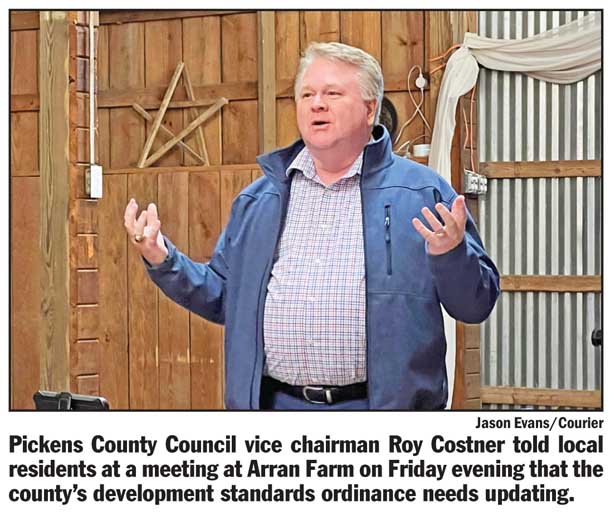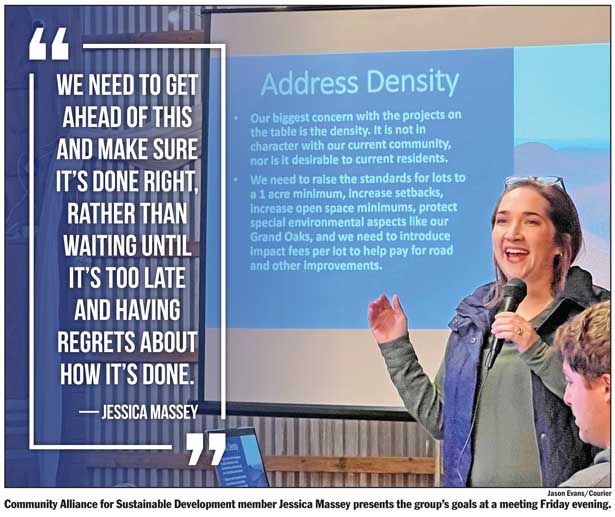‘Tipping point?’

Group wants stricter development regulations
By Jason Evans
Staff Reporter
jevans@thepccourier.com
EASLEY — A large crowd of local residents turned out to a meeting in Easley on Friday night to discuss their concerns about uncontrolled development not only in their area, but across Pickens County.
The meeting at Arran Farm launched the Community Alliance for Sustainable Development, a grassroots group that wants city, county and state leaders to hear those concerns.
“It’s really important to have this kind of turnout, because if we don’t, we’re not going to be able to affect any change,” Dr. Daniel Lee said. “We’re really concerned about the roads, the schools, the policing, the sheriff’s department … the water, the sewer.”
Speakers agreed that both the county and the municipalities need more stringent development standards.
“Changing the regulations in the county is not going to do us any good if all these properties that border the jurisdiction of the cities just keep getting annexed,” Lee said. “This isn’t going to work if we don’t have the county and the city working together, the city of Easley.”
A planned 1,268-home development at the intersection of Lenhardt Road and Jim Hunt Road “has been our tipping point,” he said.
Those roads are poorly maintained, according to Lee.
“I’ve been here 30 years,” he said. “It’s never been repaved — just patched and scrapped.”
Before more large developments are completed or announced, infrastructure studies are needed, as are studies about their impact on schools, water and sewer, according to Lee.
“We just think there ought to be rational development,” he said.
The county’s development standards ordinance “really hasn’t been changed in 30 years” and was written in a way to encourage development, Councilman Roy Costner told those in attendance at the meeting.
“They never thought about something at this scale,” he said. “Now we need to protect and preserve what we have.”
The DSO needs to be stricter, Lee said.
Pickens County Planning Commission vice chairman David Cox said the commission once reviewed two subdivisions a year.
“Now we’re doing sometimes two to three a month,” he said.
If that trend continues, in 10 years, Pickens County could have 150-250 more subdivisions, Cox said.
“It’s only going to get worse,” he said. “If the DSO doesn’t address this, where and how are all these cars going to fit on our roads?”
The group’s main goals include raising awareness about how the current lack of regulations is negatively impacting residents, demanding a moratorium targeted at large residential projects until a development plan is in place and getting a development plan passed, Jessica Massey said.
The DSO “needs a few tweaks,” she said.
“We want to get that on and we need to do it quickly,” Massey said. “The big developers are pouring into Pickens County specifically, because unlike our neighboring counties, we don’t have the zoning in place. It’s very easy for them to come in here and make their maximum profits.
“Legally, they can do it,” she continued. “They can’t be stopped. We don’t have the rules in place to regulate what they’re doing to the degree that needs to be done.”
The group wants the county to create a position to enforce the DSO, Massey said.
The proposed McKissick development would place 1,268 single-family home and townhomes in one square mile.
“We’re just not ready for that many people in such a concentrated area,” Massey said.
After 100 people voiced their concerns to the planning commission, Ryan Homes withdrew its application, she said.
“But we know they’ll be back, and if not them, it’ll be another developer,” Massey said. “It is critical that we get these changes in place immediately, that we apply the word ‘urgency’ and ‘emergency’ to this situation.”
The group is proposing a six-month moratorium on large development until the DSO can be updated or a new development plan is created.
“We need to get ahead of this and make sure it’s done right, rather than waiting until it’s too late and having regrets about how it’s done,” Massey said.
The moratorium would be specific to large residential developments.
“We do not want the moratorium to accidentally adversely affect current residents trying to build or improve on their property,” Massey said.
Impact fees are needed to help pay for infrastructure needs caused by developments, she said.
“Money does have to come from somewhere,” Massey said.
The group is not anti-development, Lee said.
“We just want sustainable, responsible development,” he said. “We need to enact some of these reforms.”
At the end of the meeting, the group broke into breakout sessions to get volunteers to work on areas such as technology, canvassing, information gathering and fundraising.
Massey urged residents to contact their elected officials often about their concerns.
“So they feel the active and constant pressure from residents to enact change,” she said.
Learn more about the group on Facebook by searching for “Community Alliance for Sustainable Development (Pickens County, SC).”
“We’re not just Pickens County,” Lee said. “We’re not just Easley city. We’re not just Clemson. We’re a community of people. We’re banding together.”




























